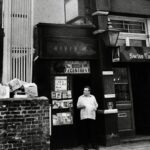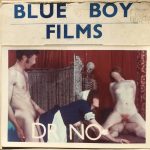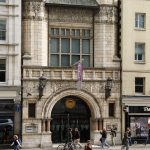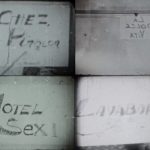In the 1950s, a new type of bookstore began to appear in Soho, with pin-up magazines on display in the front of the store but with stronger material hidden in a private back room, access to which was strictly controlled by the forbidding figure sitting behind the counter.
If the ‘chair’ – as such gatekeepers were known – granted a punter access to the backroom, they would find sets of photographs, referred to as postcards, in packs of five, which cost £1 for black and white, £2 for colour; maybe some imported magazines; and perhaps even some 8mm films, which were known as ‘rollers’ because of how they rolled when played through a projector.
At first there were only a handful of these shops in Soho’s square mile but they soon began to flourish. Artists, writers and photographers with an interest in the erotic discovered that there was a demand for words and images which went beyond the still prudish standards of the era.
If creators of content were paid what they considered a good price – albeit having to return a few days later to collect their share of sales revenue – then the profits for the shop’s owners were even more impressive.
This burgeoning underground trade could make people wealthy in a short period of time. And one who benefited from it was Ron Davey, who would gain tabloid notoriety as ‘the Millionaire Dustman’.
According to journalist Martin Tomkinson, author of The Pornbrokers, Davey was “an engaging, sociable, giant of a man”. He actually was a dustbin man, working for Hammersmith Borough council for around eight years, until an injury led to him retiring from refuse and turning his interest in amateur photography into a full-time profession.
Davey’s other pastime was naturism; he was a regular attendee of a nudist club in Surrey. As he recalled in an interview with Tomkinson, it was a bookstore owner named John Hawkesford who suggested that he combine his hobbies, taking photographs of club members for sale around Soho.
In a police interview from 1975, Davey said:
“I first became involved in pornography in the earlier fifties as a supplier to bookshops in the West End. I actually took the photographs and from the negatives reproduced large numbers of those photographs for distribution. At that stage I would take them into individual bookshops and sell them to the persons behind the counter.”
But success in this illicit trade had its downside and Davey became a person of interest to the police. He was apprehended by an officer, Inspector Murray, who had been after him for some time, and who told him that that he “owed him something”. That ‘something’ was the price he had to pay if he wanted to continue to operate.
And so Davey would meet Murray every week, usually on a Friday night, in a West End pub or restaurant, to buy him a meal or a drink. In exchange for this hospitality, Davey was
allowed to supply the shops with his photographs of Surrey nudists. He even offered Murray the use of his caravan, eventually giving it to the Inspector as a gift.
After a while Murray was replaced by another officer named Monahan, who was not satisfied with food, drink and mobile home holidays; instead he required a monthly payment of between £30 and £40.
As before, the pornographer and the policeman would meet in a West End pub, where the money would be exchanged in the bar. Most people would have called this a bribe but in Soho parlance it was known as a ‘licence’ – just another business cost in the alternative economy.
Despite these regular payments, in early 1960, Davey was raided by the police. He suspected that this related to his relationship with Murray and the gift of the caravan. Following an investigation into four premises with which Davey had connections, he was found to be in possession of around 16,000 negatives and over 18,000 photographs.
The court estimated that Davey was making £40 a week from pornography; allowing for inflation that would be £900 at 2018 values. News of the World stated that the magistrate had never before seen “such a vast volume of absolute filth”. He was sentenced to six months imprisonment.
Davey served four months then, undeterred by the experience, returned to his old ways; but it took a while for him to restart his business because the police had confiscated all of his negatives.
He now formed a friendly business alliance with Eric Ronald Mason – also known as John – or more informally as ‘God’, owing to his hold over the Soho porn trade. Mason also had an extensive list of police contacts who he was paying off.
It was a beneficial arrangement for Davey. Writer Martin Tomkinson regularly drank at the same pub as ‘the Dustman’ and remembers him as “the biggest single producer of porn” in the early 1960s.
The two most popular products at the time were erotic books and packets of postcards. Davey hit upon the idea of combining them both into a single product, known to the police and prosecutors as ‘typescripts’ but colloquially referred to as ‘Soho Bibles’.
Today they are pretty much forgotten artefacts from the history of British pornography; but in the 1960s ‘Soho Bibles’ marked a significant new format for sexually explicit entertainment.
The front cover would usually feature a drawing or a photograph, with the title printed using either a stencil or Letraset. There was never any shortage of writers in Soho who would rattle out some suitably lascivious prose to go between the covers; and pornographic pictures would be glued or stapled onto blank pages to break up the text.
The books were usually duplicated on printing machines such as those made by Gestetner, which used stencils, onto which the characters were typed, breaking the wax and allowing ink to pass onto the paper. The pages would be stapled together.
Compared with the paperbacks to be found in Foyles on Charing Cross Road, every aspect of the production process was crude but this did not put off buyers. Such was Davey’s success that he required three of the hand-cranked duplicating machines to fulfil demand. Mason had exclusive distribution of Davey’s ‘Bibles’ and it was not uncommon for 300 copies to be sold in one weekend.
Like many other businessmen, these two prosperous porn barons joined the Freemasons, which brought them into contact with another senior policeman, Detective Chief Superintendent Bill Moody, who had joined the Obscene Publications Squad (OPS) in 1965 and eventually became its Chief.
Not only would the three of them drink together in Soho pubs, they would visit each other’s homes and go on holidays together. Davey even served as Moody’s driver, when he was not chauffeuring Mason around London, occasionally taking him to crime scenes.
In police files, Davey states that he was now paying the OPS between £60 and £80 a month for his ‘licence’ to produce pornography and he was also buying Detective Constable Culver, the officer who served as his regular contact food and drink at West End establishments.
By the 1970s, the hardcore pornography trade was changing fast. In 1969 Denmark had liberalised the law allowing hardcore pornography and magazines such as Color Climax, boasting far higher production values than the primitive ‘Soho Bibles’, were being imported into the UK via a variety of clandestine routes.
Then British tabloid newspapers turned their attention to the thriving Soho economy. A 1970 exposé in The People revealed the activities of a number of pornographers. Davey escaped that time but the symbiotic relationship between Soho and Scotland Yard was about to come to an end.
It was just a short step from investigations into what went on in the back rooms of bookshops to uncovering the institutionalised corruption that was rife in the ‘Dirty Squad’. In the 27 February 1972 edition of The Sunday People, readers were presented with the headline “Bookshop owners pay £1000 a week to the police”. After more than a decade of unofficially sanctioning pornographers, the Metropolitan Police was forced to clean up its act.
Despite their close relationships with senior officers in the Obscene Publications Squad, when they were questioned by officers conducting the internal investigations, Davey and Mason both made statements.
All the same, Davey appeared hesitant to testify against DCS Moody; the worst he would say was that Mr Moody was “a bit greedy” when playing a round golf. Moody received a 12 year sentence, with the judge naming him as the “main architect of the conspiracy”.
Davey, meanwhile, maintained that he was “small time”, unlike the other porn entrepreneurs named in the trial.
After the ‘Dirty Squad’ was disbanded, it is not known what happened to the ‘Millionaire Dustman’ who had been one of the biggest producers of hardcore pornography in the United Kingdom. In his 1975 police statement, his occupation is referred to as a ‘Maintenance Engineer’, suggesting that he had left the dirty postcards business behind. He passed away in 1990







